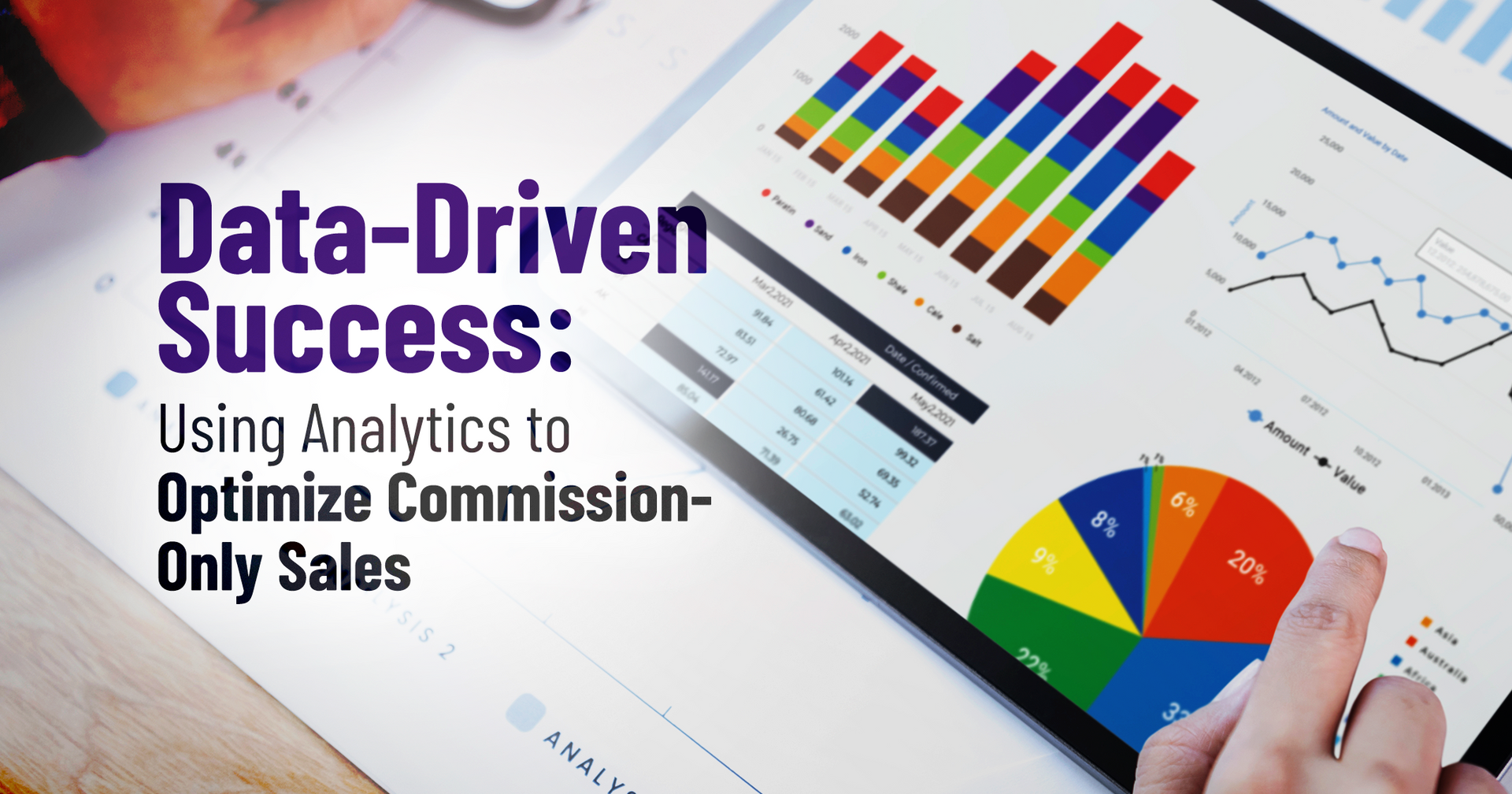
In modern business, cutting-edge data has enormous influence over decision-making and analysis. Managerial experience and intuition are important. However, they’re no longer the most prominent factors in determining sales performance. Data analytics provide sales teams with critical insights that improve team performance and add value to the entire organization.
It’s particularly important when building a commission-only sales team. If you hire commission-only sales reps, it’s key to use data to audit sales performances and make executive decisions to drive overall sales, instill confidence in sales staff, and ultimately, help the company achieve its targets.
The Role of Data Analytics in Sales
In recent years, the role of data analytics in sales has become essential for virtually every aspect of business, regardless of the industry. When it comes to commission-only sales reps, the numbers tell you everything you need to know about performance and profits.
Analytics may also be used to identify patterns and create predictive data. This can then be leveraged for target creation or incentivization plans for salespeople. Analysis allows businesses to predict future success and make better plans by adapting, adjusting, or even, redesigning their sales strategies.
When it comes to commission-only sales, in particular, analysis is essential for developing incentive plans. By looking at different sales metrics, you can create customized incentive plans for all salespeople. These help them reach their potential and maximize revenue.
Strategies for Implementing Analytics in Commission-Only Sales
Sales analytics can enable businesses to streamline sales processes, incentivize staff, and increase overall revenues.
So, let’s take a look at strategies for implementing analytics in commission-only sales. Plus, we’ll show you a practical way to level up the data science approach of a business.
1. Determine What You Want to Analyze
It may seem obvious, but far too many companies buy all the fancy analytical tools without knowing what their end goal is. With commission-only sales, there’s no need to overcomplicate things. You’ll want to use data to do straightforward, high-value tasks, like identifying top salespeople, spotting weaknesses, and noticing trends, to understand your salespeople’s ROI.
2. Establish Metrics
In addition to knowing what you’re looking for, you’ll need to establish what metrics best align with your goals. Consider key metrics such as total revenue, lead generation, conversion rate, percentage of revenue from new or existing customers, year-on-year growth, etc. These metrics will differ depending on the company.
3. Compile Data Using Sales Analytics Software
While it’s possible to manually compile data and crunch the numbers, it’s not an efficient approach, especially considering the availability of sophisticated CRMs. These programs use analytical software to analyze the data, display it in an easy-to-understand way, and provide insights that help you achieve your goals.
4. Take action
Armed with key insights and data relating to your sales team, the next step is to take action. There’s no point sitting on data and insights because their value diminishes with time. Decide how often you want to publish reports and be sure to take action based on your findings.
For example, certain locations may require more salespeople to meet demand, while other zones may not be worth the effort. Or, a particular product may no longer be hitting targets, meaning you need to reconsider the sales strategy. Regardless of how many insights you have, you won’t see change until you take action.
5. Monitor findings over time
You won’t always find valuable insights from each report. However, over longer periods, like six months or a year, you might see patterns emerging. Pay attention to data and findings over time, and take relevant action.

Benefits of Analytics in Commission-Only Sales
Analytics in commission-only sales help businesses to make it abundantly clear what is and isn’t working. With the right software, you gain access to critical data and insights in a matter of minutes that you might never have come upon had you relied on manual data collection or intuition.
In the competitive world of sales, failing to get on board with analytics puts your business at risk of falling behind. To give you a better understanding of how your business might improve with data analytics, here are a few more benefits worth considering.
1. Identify Top Performers
Firstly, data analytics allows you to quickly identify the top performers on your team. If your business model is based on hiring commission-only sales reps, you might think that revenue is the only metric that matters here, but you’re wrong. Analytics dig deeper and take into account things like conversion rates and the actual size of each deal.
The data can be used to develop a broader perspective on the performance of each salesperson. This knowledge ensures you can reward top performers and gather insights into the best-performing areas. Your top performer isn’t necessarily the person making the most sales.
2. Take Note of Underperforming Areas
Inversely, data analytics makes it abundantly clear as to what areas are underperforming. You don’t need to wait for a bad sales month to recognize a problem. Rather, you can tell right away whether a certain product or location is not meeting targets.
3. Create Incentive Initiatives
Commission-based salespeople are typically highly motivated and talented individuals who are encouraged by the prospect of making money and getting big deals over the line. However, using sales metrics, you can create even further incentives to get the most out of your staff.
Incentive programs can be tailored to the individual, for better results. They’re typically created by using past sales data to inform predictive analysis. From here, you can set targets and input rewards at various stages. Sales analytical software can help you find the right balance of targets and rewards for individuals.
4. Increased Efficiency
When you rely on data to inform decision-making, you remove the guesswork and become more efficient. Through increased efficiency, you can quickly identify ways to streamline sales processes and ultimately, improve your bottom line.
5. Reporting and Tracking
With quality analytics software, you can track data and performance metrics seamlessly in real-time. Plus, reporting becomes straightforward, as you can rely on the software to produce data and insights that are easy to digest and use to make decisions.
Conclusion
There isn’t always a right way to do things in business. However, as sophisticated data analysis tools continue to improve, they’re becoming increasingly important in sales. If you need help with building you commission-only sales strategy, contact us. At Jayce Grayye Consulting & Recruiting, we’ve helped 100s of businesses like yours, take full advantage of the commission-only sales structure.






